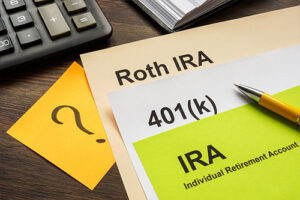Dividing Retirement Accounts in an Arizona Divorce
 Divorce can be an emotionally and financially draining experience. One of the most complex aspects is dividing marital assets and debts, including retirement accounts accumulated during the marriage. In Arizona, these accounts are generally considered community property subject to equitable distribution.
Divorce can be an emotionally and financially draining experience. One of the most complex aspects is dividing marital assets and debts, including retirement accounts accumulated during the marriage. In Arizona, these accounts are generally considered community property subject to equitable distribution.
Failing to properly value and divide retirement funds could mean losing out on thousands of dollars you’ve worked hard to save for your golden years. That’s why it’s crucial to have our experienced Arizona divorce attorney advocating for your rights and guiding you through this intricate process.
Understanding Arizona’s Community Property Laws
Arizona is one of nine US states with community property laws. This means that most assets acquired during the marriage belong equally to both spouses, regardless of whose income was used to obtain them.
When it comes to retirement accounts like 401(k)s, IRAs, pensions, and more, any contributions made and interest accrued during the marriage are considered community property subject to division. However, funds in a retirement account prior to the marriage may be considered separate property.
Common Retirement Accounts Subject to Division
Here are some of the most common types of retirement accounts that must be properly valued and divided in an Arizona divorce:
- 401(k) and 403(b) plans – These employer-sponsored defined contribution plans allow you to contribute pre-tax dollars, which then grow tax-deferred until withdrawal in retirement.
- Traditional and Roth IRAs – Individual Retirement Accounts (IRAs) are tax-advantaged accounts that allow you to save for retirement. Traditional IRAs provide an upfront tax deduction, while Roth IRAs are funded with after-tax dollars.
- Pensions – These are defined benefit plans that pay a lifetime monthly benefit based on your salary and years of service with an employer.
- Employee Stock Ownership Plans (ESOPs) – These qualified retirement plans allow employees to become owners of stock in the company they work for.
Valuing Retirement Accounts for Divorce
To ensure an equitable division, retirement accounts must first be properly valued as of a specific cut-off date, usually the date of divorce filing or legal separation. For defined contribution plans like 401(k)s and IRAs, this is relatively straightforward: the balance and any outstanding loan amounts on the cut-off date represent the total marital value.
However, valuing defined benefit pensions is more complex and may require the expertise of an actuary or certified divorce financial analyst. They calculate the present value of the future stream of payments based on factors like:
- Employee’s age, life expectancy, and years of service
- Projected retirement date
- Expected benefit amount
- Cost-of-living adjustments
- Survivor benefits.
This present value represents the marital portion subject to division upon divorce.
Methods for Dividing Retirement Accounts
Once retirement funds are valued, there are several ways to divide them between spouses in an Arizona divorce:
- Cash out and split the proceeds – The simplest but often inadvisable option is cashing out accounts and splitting the withdrawal between spouses. This triggers immediate income taxes and potential early withdrawal penalties.
- Transfer of ownership – One spouse keeps the entire account while the other spouse receives an offsetting amount of other marital assets of equal value.
- Division through a QDRO – The most common and tax-efficient way to split many retirement plans is through a Qualified Domestic Relations Order (QDRO). This court order directs the plan administrator to divide the account between the parties without triggering taxes or penalties. For defined contribution plans like 401(k)s, the non-employee spouse’s share is typically rolled over into an IRA in their name. For defined benefit pensions, the QDRO may allow the non-employee spouse to begin collecting a portion of the monthly payments upon the employee’s retirement.
Potential Tax Implications
Improperly dividing retirement assets can lead to costly tax consequences. Some key considerations:
- Early withdrawal penalties: Cashing out accounts before age 59.5 typically results in a 10% penalty on the taxable portion, in addition to ordinary income taxes owed.
- Income tax withholding: Transfers that are incident to divorce between spouses or former spouses are non-taxable events. However, rollovers to IRAs may be subject to mandatory 20% federal income tax withholding if not done properly.
- Basis recovery: For after-tax contributions like those made to Roth accounts, the tax basis carried over to each spouse must be properly calculated and allocated through the QDRO.
An experienced divorce attorney can help ensure your retirement assets are divided in the most tax-efficient manner possible.
Why You Need an Arizona Divorce Attorney
The division of retirement accounts is just one piece of the overall asset division puzzle in a divorce case. There are many other complex financial matters that must be carefully navigated, such as:
- Division of the marital home and other real estate
- Splitting investment accounts like brokerage accounts and mutual funds
- Valuation and distribution of business interests
- Allocation of credit card and other debt obligations
Not to mention, divorce involves many other legal issues surrounding child custody, child support, spousal maintenance, and more. Trying to handle all of this on your own is extremely risky.
At Goldman Law, our seasoned Arizona divorce attorneys have over 25 years of combined experience advocating for our clients’ rights and best interests. We understand the intricacies of dividing complex marital assets like retirement accounts.
Our team includes specialists like Certified Divorce Financial Analysts to ensure all assets are properly valued and divided in a tax-efficient manner. We’ll fight tirelessly to help you receive your full share of marital assets, allowing you to maintain the financial security and lifestyle you’ve worked so hard to build.
Contact us today at (602) 698-5520 to schedule a consultation.


